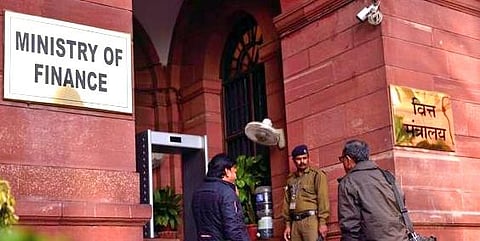

As analyzed earlier, NDA and UPA finance ministers are remarkably even when it comes to rhetoric and lofty promises. Like all politicians, they are like a duck taking to water. But a closer look at budget speeches of this century reveals a big difference in overall economic thrust.
To that extent, Jaswant Singh in 2003, P Chidambaram (2008 & 2013) and Arun Jaitley (2018) were cut from the same cloth. Yet, dig deeper into the lengthy budget speeches and one can clearly spot the fundamental differences between the UPA and NDA regimes. A caveat is necessary here. Both NDA and UPA finance ministers invoke farmers, women, youth, welfare schemes for the poor and manufacturing during budget speeches preceding Lok Sabha elections. But the differences are too vast to ignore.
Two differences become evident upon closer scrutiny. The first is: the UPA finance minister P Chidambaram used the pre-election budget speech, as indeed the other ones too, to focus more on redistribution via “welfare” measures. In contrast, the two NDA finance ministers Jaswant Singh and Arun Jaitley have focused more on long-term growth. Don’t for a moment be misled into thinking the NDA regimes ignore the poor. After all, the Narendra Modi government has mastered the art of targeted welfare to build a generation of loyal voters. It's just that NDA finance ministers do go beyond rhetoric and emphasise policies meant to drive long-term growth.
The second big difference is timing. P Chidambaram used the 2008 budget speech to announce a massive farm loan waiver scheme. In 2013, his government fought tooth and nail during the Budget session of Parliament to legislate the “Right to Food” which is now known as the National Food Security Act, 2013. In contrast, neither Jaswant Singh in 2003 nor Arun Jaitley in 2018 made any “earthshaking” welfare announcements. In fact, the Modi regime introduced quotas for the economically weaker sections (EWS) and the cash transfer scheme for farmers in January 2019, completely bypassing the Budget as a policy and political tool.
When Yashwant Sinha was finance minister in NDA-1, almost all the big ticket “growth” oriented reforms happened outside the Budget. They include the new telecom policy, FDI in insurance, a massive uptick in highway construction including the Golden Quadrilateral, disinvestment, airport privatisation, electricity sector reforms and other measures.
In his 2003 budget speech, Jaswant Singh took a lot of time to highlight these “achievements." Sure, there was talk of the poor and schemes too. But the emphasis was on reforms and growth. In his own words: “That is why reforms are so critical. And, our reform agenda must not be held hostage; either to yesterday’s debates or to subjective and selective interpretations of it. This is a collective need, for the nation’s growth, which all of us have to address together. Mr. Speaker, there is palpable impatience in the country for progress and growth. The nation cannot afford the luxury of prolonged periods of reflection, or a leisurely implementation schedule. The world will otherwise pass us by."
Compare that with the words of P Chidambaram when he presented the pre-election budget in 2008. Chidambaram, who had a penchant for quoting Thiruvalluvar, the great Tamil philosopher saint and poet, said : “Generous grants, compassion, righteous rule and succour to the downtrodden are the hallmarks of good governance. We have tried to remain true to this philosophy.”
Ten years after this, Arun Jaitley also invoked good governance during his 2018 pre-election budget speech. But the contrast is glaring: “Prime Minister Shri Narendra Modi has always stressed the importance of good governance. He has articulated the vision of ‘‘Minimum Government and Maximum Governance." This vision has inspired Government agencies in carrying out hundreds of reforms in policies, rules and procedures. This transformation is reflected in improvement of India’s ranking by 42 places in the last three years in the World Bank’s ‘Ease of Doing Business’ with India breaking into top 100 for the first time.”
Timing has also been approached differently by the two regimes. NDA-1 was unabashedly focused on infrastructure development and economic growth even though it did initiate many substantive measures. In fact, NDA-1 introduced a cess on petrol and diesel to finance highway construction. And Jaswant Singh did not use 2003 to make any grand welfare announcements. In contrast, we have seen how P Chidambaram “timed” his 2008 and 2013 budget speeches to send out a clear message to Indian voters. After Narendra Modi became Prime Minister, the timing of budget speeches became virtually redundant. Within months of assuming office, his regime launched the massive Swachh Bharat and Jan Dhan Yojana schemes. These were followed by the Ujjwala Yojana or free gas connection scheme, the last mile delivery of electricity, free medical insurance and a slew of other schemes. Arun Jaitley duly mentioned them all in his 2018 Budget speech. But after emphasising the reform measures undertaken by the government. Eleven months after the 2018 budget speech, the Modi regime sent a message to voters by introducing quotas for the EWS and launching a Rs 6000 per year cash transfer scheme for all Indian farmers. This was just a few months before the 2019 Lok Sabha elections.
For those not blinkered by ideology or political preferences, both approaches make sense for India. It would be cruel to focus only on GDP growth in an economy that remains home to hundreds of millions of poor. It would also be naïve to ignore growth and focus only on the poor and redistribution. Now, what can we expect from Nirmala Sitharaman on February 1, 2023?
Concludes.
(Sutanu Guru is Executive Director, C Voter Foundation.)